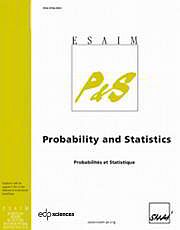Article contents
Minimax nonparametric hypothesis testingfor ellipsoids and Besov bodies
Published online by Cambridge University Press: 15 August 2002
Abstract
We observe an infinitely dimensional Gaussian random vector x = ξ + vwhereξ is a sequence of standard Gaussian variables and v ∈ l2 is anunknownmean. We consider the hypothesis testing problem H0 : v = 0versusalternatives $H_{\varepsilon,\tau}:v\in V_{\varepsilon}$  for the sets $V_{\varepsilon}=V_{\varepsilon}(\tau,\rho_{\varepsilon})\subset l_2$
for the sets $V_{\varepsilon}=V_{\varepsilon}(\tau,\rho_{\varepsilon})\subset l_2$  .The sets Vε are l q -ellipsoidsof semi-axes ai = i-s R/ε with l p -ellipsoidof semi-axes bi = i-r pε/ε removed orsimilar Besov bodies Bq,t;s (R/ε) with Besovbodies Bp,h;r (pε/ε) removed. Here $\tau =(\kappa,R)$
.The sets Vε are l q -ellipsoidsof semi-axes ai = i-s R/ε with l p -ellipsoidof semi-axes bi = i-r pε/ε removed orsimilar Besov bodies Bq,t;s (R/ε) with Besovbodies Bp,h;r (pε/ε) removed. Here $\tau =(\kappa,R)$  or $\tau =(\kappa,h,t,R);\ \\kappa=(p,q,r,s)$
or $\tau =(\kappa,h,t,R);\ \\kappa=(p,q,r,s)$  are the parameters which define thesets Vε for given radii pε → 0,0 < p,q,h,t ≤ ∞, -∞ ≤ r,s ≤ ∞, R > 0; ε → 0 is theasymptotical parameter.We study the asymptotics of minimaxsecond kind errors $\beta_{\varepsilon}(\alpha)=\beta(\alpha, V_{\varepsilon}(\tau,\rho_{\varepsilon}))$
are the parameters which define thesets Vε for given radii pε → 0,0 < p,q,h,t ≤ ∞, -∞ ≤ r,s ≤ ∞, R > 0; ε → 0 is theasymptotical parameter.We study the asymptotics of minimaxsecond kind errors $\beta_{\varepsilon}(\alpha)=\beta(\alpha, V_{\varepsilon}(\tau,\rho_{\varepsilon}))$  and construct asymptotically minimax or minimax consistent families oftests $\psi_{\alpha;\varepsilon,\tau,\rho_{\varepsilon}}$
and construct asymptotically minimax or minimax consistent families oftests $\psi_{\alpha;\varepsilon,\tau,\rho_{\varepsilon}}$  , if it is possible.We describe the partition of the set of parameters κ into regions withdifferent types of asymptotics: classical, trivial, degenerate and Gaussian(of various types).Analogous rates have been obtained in a signal detectionproblem for continuous variant of white noise model: alternativescorrespond to Besov or Sobolev balls with Besov or Sobolev balls removed.The study is based on an extension of methods of constructions ofasymptotically least favorable priors.These methods are applicable to wide class of “convex separablesymmetrical" infinite-dimensional hypothesis testingproblems in white Gaussian noise model. Under some assumptionsthese methodsare based on the reduction of hypothesis testing problemto convex extreme problem: to minimize specially defined Hilbert normover convex sets of sequences $\bar{\pi}$
, if it is possible.We describe the partition of the set of parameters κ into regions withdifferent types of asymptotics: classical, trivial, degenerate and Gaussian(of various types).Analogous rates have been obtained in a signal detectionproblem for continuous variant of white noise model: alternativescorrespond to Besov or Sobolev balls with Besov or Sobolev balls removed.The study is based on an extension of methods of constructions ofasymptotically least favorable priors.These methods are applicable to wide class of “convex separablesymmetrical" infinite-dimensional hypothesis testingproblems in white Gaussian noise model. Under some assumptionsthese methodsare based on the reduction of hypothesis testing problemto convex extreme problem: to minimize specially defined Hilbert normover convex sets of sequences $\bar{\pi}$  of measures πi on thereal line. The study of this extreme problem allows to obtain differenttypes of Gaussian asymptotics.If necessary assumptions do not hold, then we obtain other types ofasymptotics.
of measures πi on thereal line. The study of this extreme problem allows to obtain differenttypes of Gaussian asymptotics.If necessary assumptions do not hold, then we obtain other types ofasymptotics.
Keywords
Information
- Type
- Research Article
- Information
- Copyright
- © EDP Sciences, SMAI, 2000
References
- 8
- Cited by

